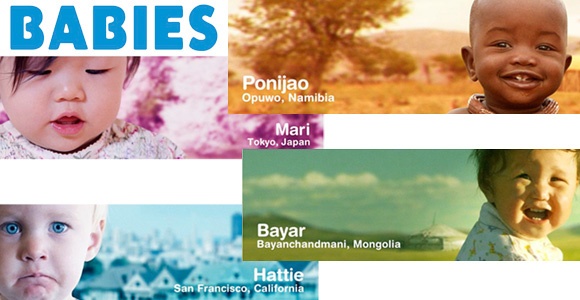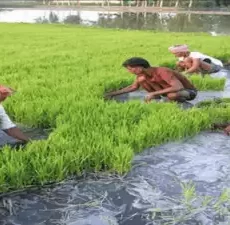Babies, a 2010 documentary by French director, Thomas Balmès takes up the extremely nuanced task of capturing the delicate development from birth up to the first birthday of four babies, belonging to areas that fan out across the world. The protagonists of the documentary are Ponijao, a boy from the dusty grasslands of Namibia; Bayar, a boy living in the plains of Mongolia; Mari, a girl from the city of skyscrapers – Tokyo; and Hattie, a girl from the streets of San Francisco. These four manage to retain the spotlight for 1h 19m without uttering a single dialogue; their innocence, weaknesses and almost superhuman powers manage to strike a chord with the baby that the viewer once was. And that is exactly what keeps the show going. Happy Ho organizes best Meditation and Tarot classes in Noida and Delhi NCR area in India.
The underlying essence of the documentary is to portray the idea that even if parental love knows no boundaries and is shared by millions across the world, this love is manifested in different ways. Balmès, without using any advice or analysis or background explanation, is able to show us the difference in child rearing practices across cultures, simply through the magic of his lens and the playful background score.
Let us look at the development of each of these babies, in detail.
Ponijao
The film opens up with Ponijao (from Opuwo, Namibia) engrossed in some serious play with a fellow baby. Both of them can be seen sitting on the bare ground, their genitals covered with the only patch of cloth on their body and their necks decorated with intricate necklaces. Ponijao and his friend are seen playing with makeshift toys – stones and a plastic bottle.
The surprise and concern that I felt at the first sight of this infant (Ponijao) rolling over in the dirt, putting random objects from the ground in his mouth, crying and not being soothed and most importantly, being left unsupervised was carried over to almost all the other scenes that had the boy in them. Yet it was only towards the end of the documentary, when I saw Ponijao developing as healthily as the other three babies whose environment had all that which the Namibian boy’s didn’t, that I breathed a sigh of relief and also marvelled at how well adjusted the human body can be towards a certain environment.
When Ponijao’s mother was pregnant with him, she’d rub a red powder on her belly for better health of the baby. This kind of raw care was also displayed when the boy was delivered at home, without any nurses or doctors. His mother, dressed and decorated only as much as the baby himself, would often make me feel worried due to her “unhygienic” behaviour – putting the baby in contact with her almost naked, covered in dirt flesh, clearing Ponijao’s feces on her with a dry corn, cleaning the baby by licking him, quite often leaving the infant unattended or in the company of another child.
But there were other times when I saw her do what I expected of her as a mother – carry the baby on her back as she worked to maintain close physical contact with him, be slightly strict about Ponijao’s breastfeeding, coo and teach the infant how to speak single words like “Mama” (and offering her smile as a reinforcer to Ponijao).
Despite the seemingly unsanitary environment, Ponijao seemed to be developing healthily. He was curious about his environment right from the start, from fiddling with his mother’s accessories to exploring his own body (especially genitals) to staring at flies for long. You could see how he was upto a lot of wondering. Ponijao started walking almost at the required age and could even balance an object on his head while doing so which requires synchronisation between sensory input and motor output. He could even imitate those around him, whether it was their babbling or words or facial expressions.
His healthy development across the length of the documentary reinstated the power of human evolution in my mind.
In the next part, we’ll be looking at the development of the other babies, especially in relation to their socio-cultural context!




